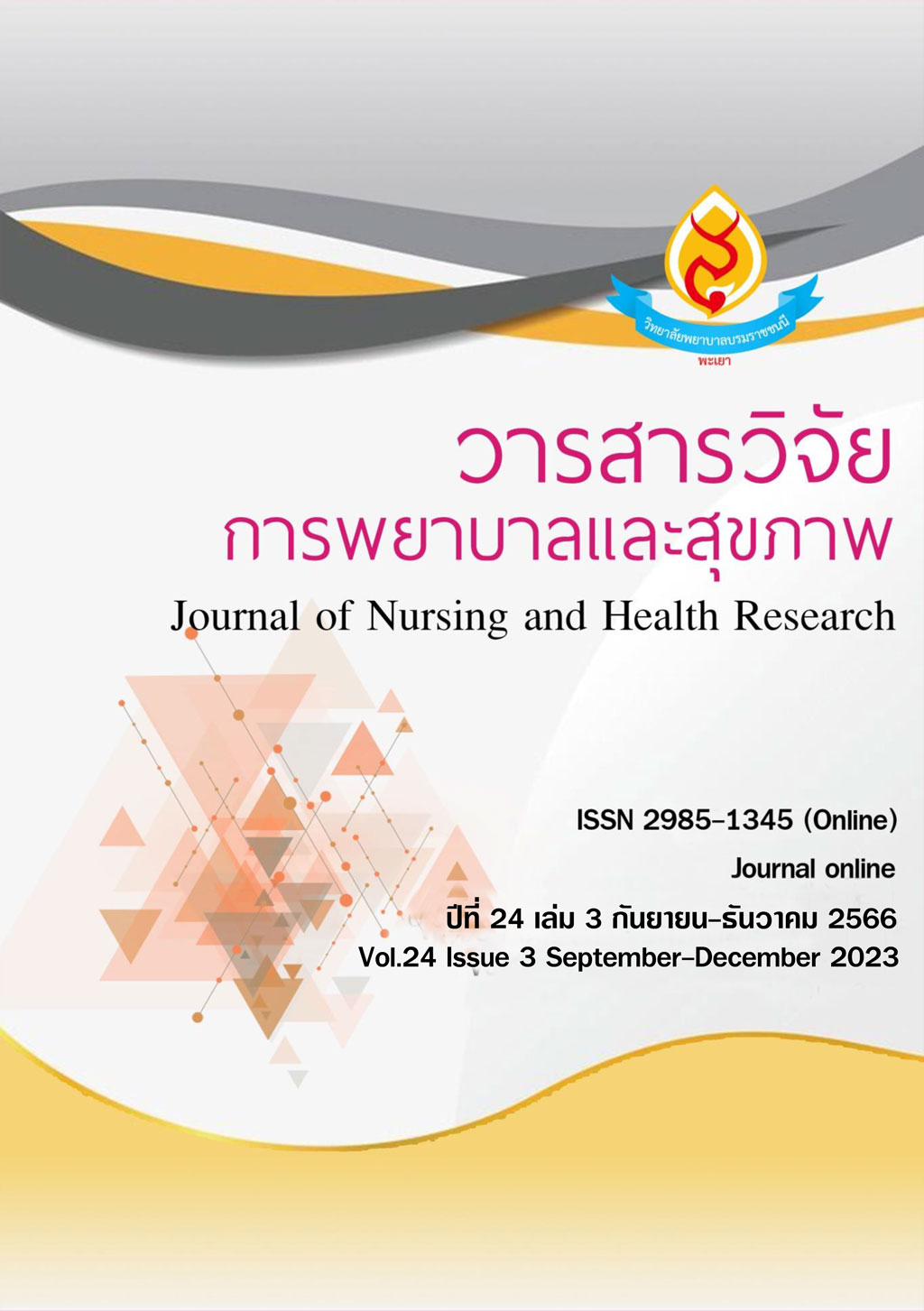ผลของโปรแกรมส่งเสริมความรอบรู้ด้านสุขภาพต่อความรอบรู้ด้านสุขภาพ พฤติกรรมป้องกันโรคความดันโลหิตสูง ระดับความดันโลหิต และดัชนีมวลกาย ของกลุ่มเสี่ยงโรคความดันโลหิตสูงในชุมชน
คำสำคัญ:
ความรอบรู้ด้านสุขภาพ, กลุ่มเสี่ยงโรคความดันโลหิตสูง, พฤติกรรมป้องกันโรคความดันโลหิตสูง, ความดันโลหิต, ดัชนีมวลกายบทคัดย่อ
บุคคลกลุ่มเสี่ยงโรคความดันโลหิตสูงควรได้รับการส่งเสริมให้มีความรอบรู้ด้านสุขภาพอย่างเหมาะสม เพื่อป้องกันการเจ็บป่วยด้วยโรคความดันโลหิตสูงในอนาคต การวิจัยกึ่งทดลองแบบสองกลุ่ม วัดผลก่อนและหลังการทดลองครั้งนี้ มีวัตถุประสงค์เพื่อศึกษาผลของโปรแกรมส่งเสริมความรอบรู้ด้านสุขภาพของกลุ่มเสี่ยงโรคความดันโลหิตสูงในชุมชน กลุ่มตัวอย่างเป็นกลุ่มเสี่ยงโรคความดันโลหิตสูง จำนวน 84 คน แบ่งเป็นกลุ่มทดลองและกลุ่มควบคุม กลุ่มละ 42 คน เครื่องมือที่ใช้ทดลองคือ โปรแกรมพัฒนาความรอบรู้ด้านสุขภาพของกลุ่มเสี่ยงโรคความดันโลหิตสูงในชุมชน เครื่องมือที่ใช้ในการรวบรวมข้อมูล คือ 1) แบบสอบถามข้อมูลส่วนบุคคล 2) แบบประเมินความรอบรู้ด้านสุขภาพและพฤติกรรมสุขภาพตามหลัก 3อ. 2ส. 3) แบบบันทึกความดันโลหิตและค่าดัชนีมวลกาย วิเคราะห์ข้อมูลโดยใช้สถิติเชิงพรรณนา สถิติไคสแควร์ สถิติทีคู่ และสถิติทีอิสระ ผลการวิจัย พบว่า กลุ่มทดลองมีคะแนนเฉลี่ยของความรอบรู้ด้านสุขภาพ และพฤติกรรมการป้องกันโรคความดันโลหิตสูง สูงกว่าก่อนทดลองและสูงกว่ากลุ่มควบคุมอย่างมีนัยสำคัญทางสถิติ รวมทั้งค่าเฉลี่ยระดับความดันโลหิตขณะหัวใจบีบตัว และค่าเฉลี่ยความดันโลหิตโดยรวมต่ำกว่าก่อนทดลองและต่ำกว่ากลุ่มควบคุม อย่างมีนัยสำคัญทางสถิติ อย่างไรก็ตามเมื่อเปรียบค่าเฉลี่ยของระดับความดันโลหิตขณะหัวใจคลายตัวและดัชนีมวลกายทั้งสองกลุ่มไม่แตกต่างกัน ผลการวิจัยชี้ให้เห็นว่าโปรแกรมส่งเสริมความรอบรู้ด้านสุขภาพตามหลัก 3อ. 2ส. เป็นกลยุทธ์ที่มีประสิทธิภาพในการพัฒนาผลลัพธ์ทางสุขภาพในกลุ่มเสี่ยงโรคความดันโลหิตสูง
เอกสารอ้างอิง
กรมสนับสนุนบริการสุขภาพ กองสุขศึกษา. (2561). โปรแกรมสุขศึกษาเพื่อการเสริมสร้างความรอบรู้ด้านสุขภาพ ตามหลัก 2 อ.(อาหาร ออกกำลังกาย) ในการป้องกันโรคเบาหวานและความดันโลหิตสูงสำหรับวัยทำงาน. นนทบุรี: กระทรวงสาธารณสุข.
กฤศภณ เทพอินทร์, สุทธีพร มูลศาสตร์ และนภาเพ็ญ จันทขัมมา. (2562). ประสิทธิผลของโปรแกรมพัฒนาความรอบรู้ด้านสุขภาพในผู้ป่วยโรคความดันโลหิตสูงที่ควบคุมความดันโลหิตไม่ได้. วารสารวิทยาลัยพยาบาลบรมราชชนนี อุตรดิตถ์, 11(1), 197-212.
คณะกรรมการอำนวยการจัดทำแผนพัฒนาสุขภาพแห่งชาติ ฉบับที่ 12 (2559). แผนพัฒนาสุขภาพแห่งชาติ ฉบับที่ 12 (พ.ศ.2560-2564). นนทบุรี: กระทรวงสาธารณสุข.
นิรชร ชูติพัฒนะ, ธีรศกดิ์ ศรีพิทักษ์ และ อิสระ ทองสามสี. (2563). ความสัมพันธ์ระหว่างความรอบรู้ด้านสุขภาพกับภาวะน้ำหนักเกินและโรคอ้วนในนักเรียนวัยรุ่น จังหวัดยะลา. ไทยเภสัชศาสตร์และวิทยาการสุขภาพ, 15(2). 98-105.
บัญชา สถิระพจน์, 2563. Hypertension and Kidney. เข้าถึงได้จาก https://cimjournal.com/nephro-conference/hypertension-and-kidney/
ประภาศรี ภูมิถาวร, นงพิมล นิมิตรอานันท์ และ ศศิธร รุจนเวช. (2560). ผลของโปรแกรมการส่งเสริมความฉลาดทางสุขภาพสำหรับนักเรียนระดับ ประถมศึกษาที่มีภาวะน้ำหนักตัวเกิน. วารสารโรงพยาบาลชลบุรี, 42(2), 169-178.
รุ่งนภา อาระหัง, สุธีรา ฮุ่นตระกูล และ ศศิธร รุจนเวช. (2561). ผลของโปรแกรมการส่งเสริมความรอบรู้ด้านสุขภาพต่อพฤติกรรมการป้องกันโรคความดันโลหิตสูงสำหรับกลุ่มเสี่ยงโรคความดันโลหิตสูงที่ชุมชนแห่งหนึ่งในจังหวัดนครปฐม. วารสารแพทย์นาวี, 45(3), 509-526.
วิชัย เอกพลากร. (บก.). (2564). รายงานการสำรวจสุขภาพประชาชนไทยโดยการตรวจร่างกายครั้งที่ 6 พ.ศ.2562-2563. กรุงเทพฯ: อักษรกราฟฟิคแอนด์ดีไซน์.
ศิรินภา วรรณประเสริฐ, สุทธีพร มูลศาสตร และ นภาเพ็ญ จันทขัมมา. (2562). ประสิทธิผลของโปรแกรมพัฒนาความรอบรู้ด้านสุขภาพในกลุ่มเสี่ยงโรคความดันโลหิตสูงที่มีน้ำหนักเกิน. วารสารการพยาบาล การสาธารณสุข และการศึกษา, 20(2), 92-158.
ศิริวรรณ ชูกำเนิด, อภิสิทธิ์ เชื้อคําเพ็ง และ นัยนันต์ เตชะวณิช. (2565). ความรอบรู้ด้านสุขภาพตามหลัก 3อ. 2ส. และการยึดมั่นในพฤติกรรมป้องกันโรคของบุคคลที่มีภาวะเสี่ยงสูงต่อโรคความดันโลหิตสูง.วารสารวิจัยการพยาบาลและสุขภาพ, 23(2), 55-70.
สมาคมความดันโลหิตสูงแห่งประเทศไทย. (2562). แนวทางการรักษาโรคความดันโลหิตสูงในเวชปฏิบัติทั่วไป พ.ศ. 2562. เชียงใหม่: ทริค ธิงค์.
อติญาณ์ ศรเกษตริน, จินตนา ทองเพชร และ อารยา ศรีวงค์ษา. (2565). ประสิทธิผลของโปรแกรมส่งเสริมและพัฒนาความรอบรู้ด้านสุขภาพต่อความรอบรู้ด้านสุขภาพ พฤติกรรมการควบคุมเบาหวานและความดันโลหิตสูง ค่าน้ำตาลสะสม และระดับความดันโลหิต. วารสารพยาบาลทหารบก, 23(1), 333-343.
อังศินันท์ อินทรกำแหง, Ann Macaskill และ Sheffield Hallam. (2562). การประเมินและการสร้างเสริมความรอบรู้ด้านสุขภาพและสุขภาวะครอบครัว กลุ่มเสี่ยงโรคไม่ติดต่อเรื้อรัง: การพัฒนาโมเดลเชิงสาเหตุทางวัฒนธรรมของ พฤติกรรมสุขภาพและโปรแกรมจิตวิทยาเชิงบวกและความรอบรู้ด้านสุขภาพ (รายงานวิจัย).กรุงเทพฯ: สำนักงานคณะกรรมการส่งเสริมวิทยาศาสตร์ วิจัยและนวัตกรรม (สกสว.)
Egan, B. M., & Stevens-Fabry, S. (2015). Prehypertension—prevalence, health risks, and management strategies. Nature Reviews Cardiology, 12(5), 289-300. doi: 10.1038/nrcardio.2015.17.
Han, H. R., Delva, S., Greeno, R. V., Negoita, S., Cajita, M., & Will, W. (2018). A health literacy-focused intervention for Latinos with hypertension. HLRP: Health Literacy Research and Practice, 2(1), e21-e25. doi: 10.3928/24748307-20180108-02
Islam, M. K., Nasrin, N., Jaber, A., & Hossain, M. T. (2022). Association between health literacy and BMI: a cross-sectional study of suburban adult population in Bangladesh. Journal of Population and Social Studies [JPSS], 30, 288-308. doi: 10.25133/JPSSv302022.018
Jun, M., & Yali, X. (2020). The management of prehypertension in young adults. Saudi Medical Journal, 41(3), 223. doi: 10.15537/smj.2020.3.24998.
Lacey, B., Lewington, S., Clarke, R., Kong, X. L., Chen, Y., Guo, Y., ... & Chen, L. (2018). Age-specific association between blood pressure and vascular and non-vascular chronic diseases in 0·5 million adults in China: a prospective cohort study. The Lancet Global Health, 6(6), e641-e649. doi: 10.1016/S2214-109X(18)30217-1.
Liu, Y. B., Liu, L., Li, Y. F., & Chen, Y. L. (2015). Relationship between health literacy, health-related behaviors and health status: A survey of elderly Chinese. International Journal of Environmental Research and Public Health, 12(8), 9714-9725.
Michou, M., Panagiotakos, D. B., & Costarelli, V. (2018). Low health literacy and excess body weight: A systematic review. Central European Journal of Public Health, 26(3), 234-241. doi: 10.21101/cejph.a5172.
Mourouti, N., Michou, M., & Costarelli, V. (2022). Health literacy in relation to health outcomes in hypertension: A systematic review. Journal of Atherosclerosis Prevention and Treatment, 13(3):109-118. doi:10.53590/japt.02.1040
Nutbeam, D. (2008). The evolving concept of health literacy. Social Science & Medicine, 67(12), 2072-2078.
Platform, G. N. (2022). Health literacy development for the prevention and control of noncommunicable diseases: Volume 4. Case studies from WHO National Health Literacy Demonstration Projects. Retrieved from https://www.who.int/publications/i/item/9789240055391
Wannasirikul, P., Termsirikulchai, L., Sujirarat, D., Benjakul, S., & Tanasugarn, C. (2016). Health literacy, medication adherence, and blood pressure level among hypertensive older adults treated at primary health care centers. Southeast Asian Journal of Tropical Medicine and Public Health, 47(1), 109.
World Health Organization. (2023a). Global report on hypertension: the race against a silent killer. Geneva: World Health Organization. Retrieved from: https://www.who.int/publications/i/item/9789240081062
World Health Organization. (2023b). Hypertension. Geneva: World Health Organization. Retrieved from: https://www.who.int/news-room/fact-sheets/detail/hypertension
Zare-Zardiny, M. R., Abazari, F., Zakeri, M. A., Dastras, M., & Farokhzadian, J. (2021). The association between body mass index and health literacy in high school Students: A cross-sectional study. Journal of Education and Health Promotion, 10, 431. doi: 10.4103/jehp.jehp_96_21
ดาวน์โหลด
เผยแพร่แล้ว
รูปแบบการอ้างอิง
ฉบับ
ประเภทบทความ
สัญญาอนุญาต
ลิขสิทธิ์ (c) 2023 วารสารวิจัยการพยาบาลและสุขภาพ

อนุญาตภายใต้เงื่อนไข Creative Commons Attribution-NonCommercial-NoDerivatives 4.0 International License.



